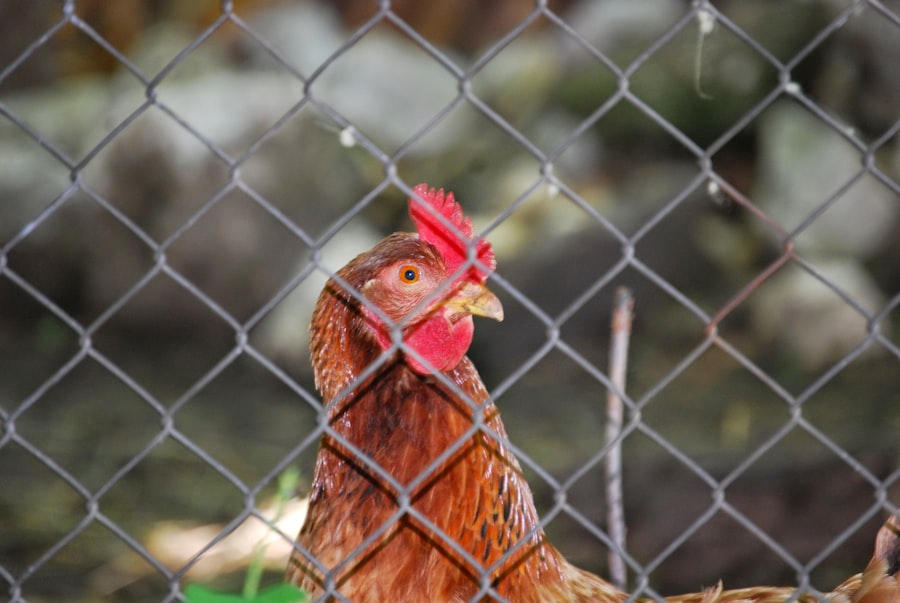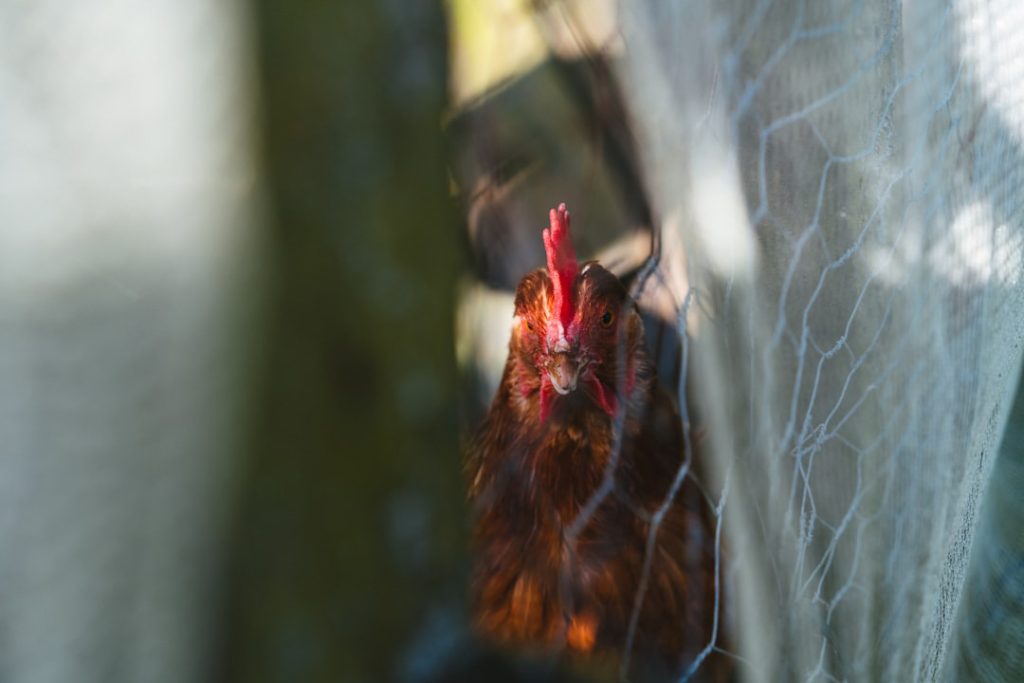Chickens are naturally inquisitive and gregarious animals with a strong foraging instinct. They are easily startled by sudden movements or loud noises. Understanding these behaviors is essential for effective chicken management and deterrence.
Chickens exhibit a characteristic scratching and pecking behavior when searching for insects, seeds, and other food items. This can result in damage to gardens, flower beds, and vegetable patches. They are particularly attracted to areas with loose soil, which facilitates scratching and dust bathing.
The social nature of chickens is evident in their tendency to follow the lead of dominant flock members. When one chicken discovers a new foraging area, the rest of the flock is likely to follow. This social dynamic can influence their movement patterns and exploration of new areas.
By comprehending these behavioral traits, poultry keepers and gardeners can better anticipate potential problem areas and implement proactive measures to prevent chicken-related damage or disruption. This knowledge forms the basis for developing effective strategies to manage chicken movements and protect designated areas from their foraging activities.
Table of Contents
- 1 Creating Physical Barriers
- 2 Using Natural Deterrents
- 3 Implementing Scare Tactics
- 4 Providing Alternative Areas for Foraging
- 5 Consistent Monitoring and Maintenance
- 6 Seeking Professional Assistance
- 7 FAQs
- 7.1 What are some effective ways to keep chickens out of a vegetable garden?
- 7.2 What type of fencing is best for keeping chickens out of a vegetable garden?
- 7.3 What are some natural deterrents that can be used to keep chickens out of a vegetable garden?
- 7.4 How can physical barriers be used to keep chickens out of a vegetable garden?
- 7.5 Why is it important to provide alternative areas for chickens to forage?
Key Takeaways
- Chickens are naturally curious and will explore their surroundings
- Physical barriers such as fences and netting can prevent chickens from accessing certain areas
- Natural deterrents like citrus peels and strong-smelling herbs can discourage chickens from specific areas
- Scare tactics like motion-activated devices or predator decoys can startle chickens and deter them from unwanted areas
- Providing alternative foraging areas with treats and distractions can redirect chickens’ attention away from off-limits areas
- Consistent monitoring and maintenance of barriers and deterrents is essential for long-term success
- Seeking professional assistance from a poultry expert or animal behaviorist can provide additional insights and solutions
Creating Physical Barriers
Choosing the Right Materials
By creating a barrier around the area you want to protect, you can prevent chickens from gaining access and causing damage.
Installing the Barrier
When using fencing or netting, it’s important to make sure that it is tall enough to prevent chickens from flying over it. Additionally, the barrier should be buried into the ground to prevent chickens from digging underneath it.
Protecting Vulnerable Areas
Another option for creating physical barriers is to use chicken wire or mesh to cover vulnerable areas, such as newly planted seeds or delicate plants. This can prevent chickens from scratching and pecking at the soil, while still allowing sunlight and water to reach the plants.
By creating physical barriers, you can effectively protect your garden, flower beds, and other vulnerable areas from chicken damage.
Using Natural Deterrents

In addition to physical barriers, natural deterrents can also be effective in keeping chickens away from certain areas. One common natural deterrent is the use of strong-smelling plants, such as lavender, mint, or marigolds. Chickens are known to dislike strong scents, so planting these types of plants around vulnerable areas can help deter them from venturing too close.
Additionally, certain plants, such as rosemary and thyme, have been found to have insect-repelling properties, which can also help protect vulnerable plants from chicken foraging. Another natural deterrent that can be effective in keeping chickens away is the use of predator decoys. Placing decoys of natural predators, such as owls or hawks, in the area can create the illusion of danger and deter chickens from approaching.
Additionally, the presence of predator decoys can help disrupt the chickens’ sense of security and make them more cautious about venturing into certain areas. By using natural deterrents, you can effectively keep chickens away from vulnerable areas without causing them harm.
Implementing Scare Tactics
Scare tactics can also be effective in deterring chickens from certain areas. One common scare tactic is the use of noise, such as clapping hands or using a whistle, to startle chickens and make them retreat. Another option is to use visual scare tactics, such as hanging shiny objects or reflective tape in the area.
The movement and reflection of these objects can create a sense of danger and make chickens more cautious about approaching. Another effective scare tactic is the use of motion-activated devices, such as sprinklers or sound machines. These devices are triggered when chickens approach and create a sudden burst of water or noise, which can startle them and make them retreat.
By implementing scare tactics, you can effectively deter chickens from certain areas without causing them harm.
Providing Alternative Areas for Foraging
One effective way to keep chickens away from vulnerable areas is by providing them with alternative areas for foraging. By designating a specific area for chickens to scratch and peck at the ground, you can redirect their natural behavior away from vulnerable plants and gardens. This can be done by creating a designated foraging area with loose soil or mulch where chickens can scratch and dust bathe without causing damage.
Another option is to provide chickens with a variety of enrichment activities, such as hanging treats or toys for them to peck at. By keeping chickens engaged and entertained, you can reduce their interest in venturing into vulnerable areas. Additionally, providing chickens with a balanced diet that meets their nutritional needs can help reduce their instinct to forage for additional food in vulnerable areas.
Consistent Monitoring and Maintenance

Proactive Measures to Prevent Damage
This may include repairing or reinforcing physical barriers, replenishing natural deterrents, or adjusting scare tactics as needed.
Maintaining Designated Foraging Areas
Additionally, consistent maintenance of designated foraging areas can help keep chickens engaged and reduce their interest in venturing into vulnerable areas. By regularly refreshing the soil or mulch in these areas and providing new enrichment activities, you can keep chickens occupied and less likely to cause trouble elsewhere.
Key to Effective Deterrence
Consistent monitoring and maintenance are key to effectively deterring chickens from vulnerable areas.
Seeking Professional Assistance
In some cases, deterring chickens from certain areas may require professional assistance. If you are struggling to keep chickens away from vulnerable plants or gardens, it may be helpful to consult with a professional who has experience in poultry management. They can provide valuable insights and recommendations for deterring chickens based on their behavior and social dynamics.
Additionally, professional assistance may be necessary if you are dealing with a large number of chickens or a particularly persistent flock. In these cases, a professional may be able to provide more advanced solutions, such as installing electric fencing or using non-toxic repellents that are safe for both chickens and plants. Seeking professional assistance can help ensure that you are effectively deterring chickens from vulnerable areas while also promoting their well-being.
In conclusion, understanding the behavior of chickens is crucial when it comes to deterring them from certain areas. By creating physical barriers, using natural deterrents, implementing scare tactics, providing alternative areas for foraging, consistent monitoring and maintenance, and seeking professional assistance when necessary, you can effectively keep chickens away from vulnerable plants and gardens while promoting their well-being.
If you’re looking for more tips on keeping chickens out of your vegetable garden, you might want to check out this article on chicken coop nest boxes. It offers valuable information on creating a comfortable and secure space for your chickens, which can help prevent them from wandering into your garden and causing damage.
FAQs
What are some effective ways to keep chickens out of a vegetable garden?
Some effective ways to keep chickens out of a vegetable garden include using fencing, creating physical barriers, using natural deterrents, and providing alternative areas for the chickens to forage.
What type of fencing is best for keeping chickens out of a vegetable garden?
A sturdy wire or mesh fencing that is at least 4 feet tall and buried a few inches into the ground is best for keeping chickens out of a vegetable garden. This type of fencing will prevent the chickens from digging under or flying over it.
What are some natural deterrents that can be used to keep chickens out of a vegetable garden?
Natural deterrents such as citrus peels, coffee grounds, or cayenne pepper can be sprinkled around the perimeter of the vegetable garden to deter chickens. These items have strong scents or tastes that chickens typically find unpleasant.
How can physical barriers be used to keep chickens out of a vegetable garden?
Physical barriers such as low fences, chicken wire cloches, or row covers can be used to physically block chickens from accessing the vegetable garden. These barriers should be securely anchored to the ground to prevent the chickens from getting underneath them.
Why is it important to provide alternative areas for chickens to forage?
Providing alternative areas for chickens to forage can help redirect their natural instinct to scratch and peck. By providing designated foraging areas with plenty of vegetation and insects, chickens are less likely to be tempted to enter the vegetable garden.
Meet Walter, the feathered-friend fanatic of Florida! Nestled in the sunshine state, Walter struts through life with his feathered companions, clucking his way to happiness. With a coop that’s fancier than a five-star hotel, he’s the Don Juan of the chicken world. When he’s not teaching his hens to do the cha-cha, you’ll find him in a heated debate with his prized rooster, Sir Clucks-a-Lot. Walter’s poultry passion is no yolk; he’s the sunny-side-up guy you never knew you needed in your flock of friends!







